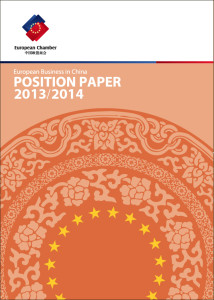 On 5th September, 2013, the European Chamber published the European Business in China Position Paper 2013/2014. It draws directly from the knowledge and expertise of their 1,700 member companies following a six-month consultative process. Already in its 13th edition, this year’s Position Paper includes 26 vertical industry working group papers, eight horizontal industry working group papers, eight local papers and more than 800 recommendations.
On 5th September, 2013, the European Chamber published the European Business in China Position Paper 2013/2014. It draws directly from the knowledge and expertise of their 1,700 member companies following a six-month consultative process. Already in its 13th edition, this year’s Position Paper includes 26 vertical industry working group papers, eight horizontal industry working group papers, eight local papers and more than 800 recommendations.
The Executive Position Paper aims to capture the essence of the many issues raised in the working group papers and propose constructive recommendations that promote China’s sustainable economic growth. What follows is a summary of this paper.
There is widespread consensus that China needs to embark on a new round of structural reforms. Better use of market forces is the catalyst that will ensure that China’s increasingly limited resources are directed to the most productive areas of society. This inevitably entails a fundamental reassessment of the government’s role in the economy and business environment.
The government strongly controls the business environment. It not only acts as a regulator and enforcement agency but also steers industrial development, brings a top-down approach to guiding technology choices and uses many industrial policies to spur domestic industry growth and innovation.
It also carries out commercial activities through state-owned enterprises (SOEs) and directs the flow of investment and capital through control of the financial system. This has led to market-distortions, mispriced capital, over-investment and over-capacities, local and corporate debt and stifled consumer demand and innovation. Furthermore it serves to compete against market forces.
The government therefore needs to fundamentally reassess its role to bring about the necessary restructuring to attain sustainable growth.
The Executive Position Paper identifies three key areas where the government needs to modify its approach to — and in many cases cede control over — the business environment in order to affect the necessary restructuring.
Strike a new balance between market forces and government control

L-R: Secretary General Adam Dunnett, President Davide Cucino, and Head of Chamber Communications Mark Rushton at the press launch of the Position Paper
In some areas the government is too absent from the market and needs to strengthen its capacity to formulate top-level regulations while enforcing existing regulations in a transparent and fair manner. In other areas the government is too dominant and needs to step back in order to strengthen market forces, primarily through institutional reforms to the financial system, the role of SOEs and through the reduction of industrial policies and costly subsidies that are distorting markets.
A successful economic transition must be preceded by a regulatory transition in which the government finds its proper role in an increasingly modern economy. Building up a transparent regulatory and enforcement capacity is an extremely difficult task, but is something that must be done in order to foster a vibrant market economy.
It is equally important to leverage the contributions that business can make through greater structural reform, the most important of which are:
- Financial reform
China’s financial system and the privileged relationship between the state-owned banks, SOEs and local governments that it serves means that household savings are used to subsidise lending, much of which is directed at marginal investment projects to prop up unproductive SOEs and to finance wasteful local government projects. This results in risk being built up in bank, corporate and local government leverage.
“Reform is the biggest dividend for China.” — Premier Li Keqiang[1]
- Industrial policy reform
The government uses a plethora of interventionist measures to attempt to develop domestic industries. Local governments have provided direct and indirect subsidies, and other favourable conditions, to local companies in a number of sectors into which the Chinese Government has encouraged significant financial investment. This is the major cause of market inefficiencies and overcapacity in many of these sectors.
- SOE reform
The European Chamber believes that SOEs can play an important role by providing public goods and services at affordable prices in sectors where demand is not sufficient to generate an efficient or effective market-based response from the private sector.
“State-owned enterprises and private enterprises should be treated equally.” — Premier Li Keqiang[2]
Although SOEs can play a role in sectors of special strategic interest to the government they should not be protected from competition or enjoy special privileges. China’s sustainable economic development and rebalancing relies upon private enterprises being able to fully develop alongside SOEs in an environment of fair competition. In practice, this will require SOEs to steadily withdraw from many areas of the market.
Reforms and orderly privatisation could unleash a wealth of innovative potential and efficiency in key sectors currently dominated by SOEs.
Reassess the government’s approach to technology and innovation
China’s strong emphasis on technological and scientific development has played a key role in driving economic growth. Both international and domestically-developed innovations have greatly improved China’s technological level and overall productivity, but it has reached a point where it has caught up with the leading technologies in many, but not all, sectors.
Nationalistic approach to indigenous innovation
To move further up the value chain, China will have to re-examine some of its misguided indigenous innovation policies — including national standards, government-developed catalogues, forced technology transfer measures, forced disclosure of proprietary information, preferential public procurement practices, and unequal research and development (R&D) funding systems.
China’s implementation of these policies reflects a nationalistic approach that in many regards appears to serve simply as a tool to capture greater market share for domestic enterprises and to use China’s large marketplace to promote domestic technologies.
While the government can and must play an important role in designing the framework and providing incentives and guidance for innovation, the European Chamber believes that, contrary to intent, some of these nationalistic, indigenous innovation policies — in addition to China’s top-down approach to technology innovation — do not actually promote domestic innovation capacities.
While trying to promote future areas of growth and innovation, it is equally important to implement existing technologies efficiently. In most fields China has access to the many of the best technologies available, but if these technologies are not employed correctly they may be of little use.
Rather than micro-managing technology choices through detailed regulations and standards, industry should be given greater flexibility in choosing technologies and applying these efficiently within systems.
Bring China’s investment environment closer to international norms
China’s re-emergence onto the world stage continues to be welcomed with both excitement and trepidation. Despite the fact that many foreign companies have benefited from doing business in China’s domestic market, global consumers are eager to buy China’s exports and governments from around the world are courting Chinese investment, many people outside the Middle Kingdom continue to regard China with scepticism and doubt its true intentions.
As the country’s growth rate slows during its economic restructuring, Chinese companies will increasingly need to go global to ensure sustained growth. Greater integration into the global marketplace and a further assimilation of international systems and practices into the domestic business environment would help this process.
Improve market access conditions
China’s current domestic policies have important international implications and can negatively affect the perception of Chinese companies abroad. Until China creates the same kind of access to its markets that it receives elsewhere in the world — which is particularly broad in Europe — it will not be seen as an equal and fair player by the West.
Protectionist domestic policies could therefore add additional obstacles to the internationalisation of Chinese companies due to the trade tensions they are generating with China’s major trading partners and the increase of corresponding calls for reciprocal treatment against Chinese companies abroad.
China has used the vast size of its marketplace to protect domestic companies and to place restrictive market access conditions on foreign companies. Market access remains the major concern of European business in China.
The European Union (EU) does not have a term for categorising investment as foreign. If a Chinese or other non-EU company legally invests in Europe, the resultant legal entity is considered European. As such, Europe remains resiliently open and Chinese companies are increasingly entering markets in Europe that European enterprises are not allowed to access in China.[3]
The potential benefits of a fully reciprocal, bilateral trade relationship are enormous. However, systematic market access restrictions and discriminatory treatment issues continuously heap pressure on governments to tackle these problems, and are leading some to increasingly perceive China as an adversary rather than a partner.
Taking a global leadership role in harmonisation
Where domestic regulations and standards deviate from international practices, Chinese companies face additional costs as their products have to comply with different systems. Chinese mandated standards frequently do not have global interoperability. Deviation from international practices risks isolating Chinese industry from global systems and international trends.
Rather than seeing international exchange as a one-way process in which China is adapting foreign practices, Chinese companies should be encouraged to actively engage in these processes to drive the industries forward and develop standards for products that could benefit from global economies of scale.
Leadership in international trading systems
As China aims to expand investment globally its leadership role can and should be used to further influence the evolution and expansion of the World Trade Organization (WTO) in the Doha Development Round (DDA) to lower trade barriers around the world at a multilateral level.
China also has an enormous opportunity to use the negotiations of bilateral investment agreements with its two major trading partners, the EU and the United States—like it used the leverage of WTO membership in the 1990s—to lock in trade and investment liberalisation and to repel anti-reformers in China. Comprehensive agreements covering both post-establishment and pre-establishment national treatment would be beneficial for both China and the world and could pave the way for future free trade agreements or for allowing China to take a leadership role in expanding the DDA.
To download your free copy of the complete Position Paper 2013/2014, including all Chamber recommendations, please go to http://www.europeanchamber.com.cn/en/publications-position-paper.
[2] Li Keqiang: State-owned enterprises and private enterprises should be treated equally. http://money.163.com/13/0414/17/8SEHQ03R00254TI5.html
[3] Chinese ODI in the European Union. European Union Chamber of Commerce (2013). http://europeanchamber.com.cn/en/publications-chinese-outbound-investment-eu-european-union
[c1]More…





Recent Comments